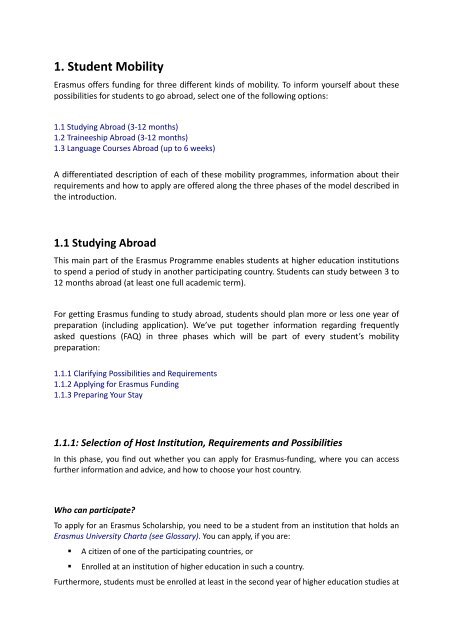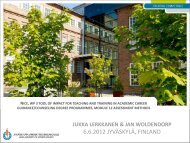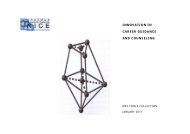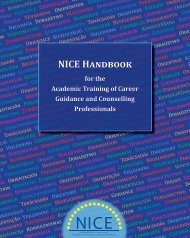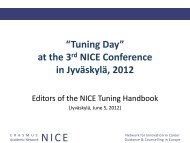I am looking for information on student's mobility - Nice-network.eu
I am looking for information on student's mobility - Nice-network.eu
I am looking for information on student's mobility - Nice-network.eu
You also want an ePaper? Increase the reach of your titles
YUMPU automatically turns print PDFs into web optimized ePapers that Google loves.
1. Student Mobility<br />
Erasmus offers funding <str<strong>on</strong>g>for</str<strong>on</strong>g> three different kinds of <strong>mobility</strong>. To in<str<strong>on</strong>g>for</str<strong>on</strong>g>m yourself about these<br />
possibilities <str<strong>on</strong>g>for</str<strong>on</strong>g> students to go abroad, select <strong>on</strong>e of the following opti<strong>on</strong>s:<br />
1.1 Studying Abroad (3-12 m<strong>on</strong>ths)<br />
1.2 Traineeship Abroad (3-12 m<strong>on</strong>ths)<br />
1.3 Language Courses Abroad (up to 6 weeks)<br />
A differentiated descripti<strong>on</strong> of each of these <strong>mobility</strong> progr<str<strong>on</strong>g>am</str<strong>on</strong>g>mes, in<str<strong>on</strong>g>for</str<strong>on</strong>g>mati<strong>on</strong> about their<br />
requirements and how to apply are offered al<strong>on</strong>g the three phases of the model described in<br />
the introducti<strong>on</strong>.<br />
1.1 Studying Abroad<br />
This main part of the Erasmus Progr<str<strong>on</strong>g>am</str<strong>on</strong>g>me enables students at higher educati<strong>on</strong> instituti<strong>on</strong>s<br />
to spend a period of study in another participating country. Students can study between 3 to<br />
12 m<strong>on</strong>ths abroad (at least <strong>on</strong>e full academic term).<br />
For getting Erasmus funding to study abroad, students should plan more or less <strong>on</strong>e year of<br />
preparati<strong>on</strong> (including applicati<strong>on</strong>). We’ve put together in<str<strong>on</strong>g>for</str<strong>on</strong>g>mati<strong>on</strong> regarding frequently<br />
asked questi<strong>on</strong>s (FAQ) in three phases which will be part of every student’s <strong>mobility</strong><br />
preparati<strong>on</strong>:<br />
1.1.1 Clarifying Possibilities and Requirements<br />
1.1.2 Applying <str<strong>on</strong>g>for</str<strong>on</strong>g> Erasmus Funding<br />
1.1.3 Preparing Your Stay<br />
1.1.1: Selecti<strong>on</strong> of Host Instituti<strong>on</strong>, Requirements and Possibilities<br />
In this phase, you find out whether you can apply <str<strong>on</strong>g>for</str<strong>on</strong>g> Erasmus-funding, where you can access<br />
further in<str<strong>on</strong>g>for</str<strong>on</strong>g>mati<strong>on</strong> and advice, and how to choose your host country.<br />
Who can participate?<br />
To apply <str<strong>on</strong>g>for</str<strong>on</strong>g> an Erasmus Scholarship, you need to be a student from an instituti<strong>on</strong> that holds an<br />
Erasmus University Charta (see Glossary). You can apply, if you are:<br />
• A citizen of <strong>on</strong>e of the participating countries, or<br />
• Enrolled at an instituti<strong>on</strong> of higher educati<strong>on</strong> in such a country.<br />
Furthermore, students must be enrolled at least in the sec<strong>on</strong>d year of higher educati<strong>on</strong> studies at
the beginning of their study period abroad. There is no age limit <str<strong>on</strong>g>for</str<strong>on</strong>g> taking part in the Erasmus<br />
Progr<str<strong>on</strong>g>am</str<strong>on</strong>g>me.<br />
Which countries can I visit with the Erasmus Progr<str<strong>on</strong>g>am</str<strong>on</strong>g>me?<br />
All 27 members of the EU take part in the Erasmus Progr<str<strong>on</strong>g>am</str<strong>on</strong>g>me. Furthermore Norway, Iceland,<br />
Liechtenstein, Turkey and Switzerland are cooperati<strong>on</strong>-partners.<br />
Do I need to have special language skills?<br />
There is no defined language level you have to attain to take part in the progr<str<strong>on</strong>g>am</str<strong>on</strong>g>me. Still, some<br />
instituti<strong>on</strong>s might require you to provide evidence that you will be able to attend classes in a<br />
particular language in order <str<strong>on</strong>g>for</str<strong>on</strong>g> them to support your request. At least you should have basic<br />
knowledge of the language of your chosen host country and be able to communicate.<br />
The Erasmus Progr<str<strong>on</strong>g>am</str<strong>on</strong>g>me also offers special language classes (→ Erasmus Intensive Language<br />
Courses) <str<strong>on</strong>g>for</str<strong>on</strong>g> less spoken languages in the countries where they are used as teaching medium at<br />
higher educati<strong>on</strong> instituti<strong>on</strong>s. For these courses you need to apply independently from your<br />
applicati<strong>on</strong> <str<strong>on</strong>g>for</str<strong>on</strong>g> a scholarship to study abroad. Of course, such classes can be combined with<br />
funding <str<strong>on</strong>g>for</str<strong>on</strong>g> a l<strong>on</strong>ger stay abroad.<br />
Which instituti<strong>on</strong>s can I visit?<br />
You can <strong>on</strong>ly go <str<strong>on</strong>g>for</str<strong>on</strong>g> an exchange with a <str<strong>on</strong>g>for</str<strong>on</strong>g>eign instituti<strong>on</strong> if your faculty or institute at your home<br />
university and the selected host instituti<strong>on</strong> share a partnership agreement. Also, at least the<br />
sending or the receiving country must be an EU Member State.<br />
Find in<str<strong>on</strong>g>for</str<strong>on</strong>g>mati<strong>on</strong> <strong>on</strong> your instituti<strong>on</strong>’s partners through the Erasmus homepage of your home<br />
university or institute.<br />
What should I c<strong>on</strong>sider when choosing a host instituti<strong>on</strong>?<br />
D<strong>on</strong>’t <strong>on</strong>ly select your host instituti<strong>on</strong> based <strong>on</strong> its locati<strong>on</strong> or academic reputati<strong>on</strong>. Also take<br />
into account other criteria when making your choice. For ex<str<strong>on</strong>g>am</str<strong>on</strong>g>ple, smaller and less known<br />
universities often provide a more pers<strong>on</strong>al stay. Some HEI offer good student-tutor relati<strong>on</strong>ships<br />
or additi<strong>on</strong>al progr<str<strong>on</strong>g>am</str<strong>on</strong>g>mes to bring you into c<strong>on</strong>tact with the local students. We advise you to<br />
seek in<str<strong>on</strong>g>for</str<strong>on</strong>g>mati<strong>on</strong> <strong>on</strong> different possible host instituti<strong>on</strong>s and think about what is really important<br />
<str<strong>on</strong>g>for</str<strong>on</strong>g> you. In particular, you should c<strong>on</strong>sider whether the courses offered at the host instituti<strong>on</strong><br />
match your interests and will be accredited by your home instituti<strong>on</strong>s. For in<str<strong>on</strong>g>for</str<strong>on</strong>g>mati<strong>on</strong> <strong>on</strong> highquality<br />
criteria, see our appendix.<br />
How much m<strong>on</strong>ey will I get?<br />
Taking part in the Erasmus progr<str<strong>on</strong>g>am</str<strong>on</strong>g>me you will get a grant to help you cover the travel and<br />
subsistence costs incurred in c<strong>on</strong>necti<strong>on</strong> with your study period abroad. The m<strong>on</strong>thly rates vary,<br />
depending <strong>on</strong> the home instituti<strong>on</strong> and host country.<br />
Furthermore you are exempted from paying fees <str<strong>on</strong>g>for</str<strong>on</strong>g> tuiti<strong>on</strong>, registrati<strong>on</strong>, ex<str<strong>on</strong>g>am</str<strong>on</strong>g>inati<strong>on</strong>s and<br />
access to laboratory and library facilities at the host instituti<strong>on</strong> during your stay abroad.
It is also possible to receive additi<strong>on</strong>al allowances (Scholarships, housing assistance...)<br />
1.1.2: Applicati<strong>on</strong> <str<strong>on</strong>g>for</str<strong>on</strong>g> Erasmus Funding<br />
This phase will give you in<str<strong>on</strong>g>for</str<strong>on</strong>g>mati<strong>on</strong> about where, how and when to apply <str<strong>on</strong>g>for</str<strong>on</strong>g> an Erasmus-<br />
Scholarship.<br />
Where do I apply?<br />
Usually you have to apply <str<strong>on</strong>g>for</str<strong>on</strong>g> an Erasmus-Scholarship at the coordinati<strong>on</strong>-office of your faculty or<br />
instituti<strong>on</strong> (not at the office of the nati<strong>on</strong>al agency!). To get further in<str<strong>on</strong>g>for</str<strong>on</strong>g>mati<strong>on</strong> of the exact<br />
applicati<strong>on</strong> process and requirements, c<strong>on</strong>tact the Nati<strong>on</strong>al Agency (→<br />
http://ec.<strong>eu</strong>ropa.<strong>eu</strong>/educati<strong>on</strong>/lifel<strong>on</strong>g-learning-progr<str<strong>on</strong>g>am</str<strong>on</strong>g>me/nati<strong>on</strong>al_en.htm) office at your<br />
home university or the Erasmus coordinator of your faculty or institute.<br />
How do I apply?<br />
Depending <strong>on</strong> the c<strong>on</strong>diti<strong>on</strong>s of your home instituti<strong>on</strong>s the requirements <str<strong>on</strong>g>for</str<strong>on</strong>g> an applicati<strong>on</strong> may<br />
differ. Some universities just want to have the mandatory <str<strong>on</strong>g>for</str<strong>on</strong>g>ms and a letter of motivati<strong>on</strong>, others<br />
also have pers<strong>on</strong>al interviews.<br />
When do I apply?<br />
The applicati<strong>on</strong> deadlines vary, but usually you have to apply <strong>on</strong>e year in advance of your<br />
intended stay abroad. But remember: At the time of beginning your study period abroad you<br />
need to be at least in the sec<strong>on</strong>d year of your higher educati<strong>on</strong> studies. This counts from the first<br />
semester at an higher educati<strong>on</strong> instituti<strong>on</strong>, no matter if you changed your subject or university<br />
in between.<br />
1.1.3 Preparing Your Stay<br />
This phase will give you in<str<strong>on</strong>g>for</str<strong>on</strong>g>mati<strong>on</strong> about administrative and organisati<strong>on</strong>al things to be d<strong>on</strong>e<br />
be<str<strong>on</strong>g>for</str<strong>on</strong>g>e you can start your stay abroad.<br />
Which administrative things do I have to organise now?<br />
Once your applicati<strong>on</strong> <str<strong>on</strong>g>for</str<strong>on</strong>g> an Erasmus-Scholarship has been successful you are asked to sign an<br />
agreement. With this agreement you accept the rules of the Erasmus Progr<str<strong>on</strong>g>am</str<strong>on</strong>g>me and take the<br />
place at the host instituti<strong>on</strong>.<br />
Then your Erasmus office/coordinator will enrol you at your host-university and register you at<br />
the Nati<strong>on</strong>al Agency (→ http://ec.<strong>eu</strong>ropa.<strong>eu</strong>/educati<strong>on</strong>/lifel<strong>on</strong>g-learningprogr<str<strong>on</strong>g>am</str<strong>on</strong>g>me/nati<strong>on</strong>al_en.htm).
Together with the respective Erasmus coordinator at your instituti<strong>on</strong> you will file a so called<br />
„Learning-Agreement“. This agreement is some kind of insurance <str<strong>on</strong>g>for</str<strong>on</strong>g> getting credited your ECTS<br />
points which you collect during your stay abroad.<br />
What is a Learning agreement and what about my ECTS Points?<br />
The learning agreement is elaborated from the student in c<strong>on</strong>sultati<strong>on</strong> with the respective<br />
Erasmus coordinator. In the agreement you have to present which courses you want to join at<br />
your host instituti<strong>on</strong>. Of course you can also change courses afterwards (after c<strong>on</strong>sulting the<br />
coordinator at your home university).<br />
If you are not able to achieve all the ECTS Points as fixed in your learning agreement during your<br />
stay abroad it is not all too bad. But at least you should show that you were willing to study and<br />
acquire more or less the aims you have agreed up<strong>on</strong> in the agreement. Otherwise (at worst) you<br />
will have to pay back your Erasmus-Scholarship.<br />
In the case that your home university doesn't accept the ECTS Points your have accumulated at<br />
the host instituti<strong>on</strong> (despite the arrangements you have made in the learning agreement) you<br />
should to clarify this with the respective Erasmus-coordinator.<br />
Do I need a special health insurance?<br />
Be<str<strong>on</strong>g>for</str<strong>on</strong>g>e you go abroad you should check whether your health insurance covers expenses<br />
occurring during your stay abroad. If not, you have to organise such an additi<strong>on</strong>al insurance<br />
yourself. Some nati<strong>on</strong>al agencies offer group insurances.<br />
Which kind of support does my home university or host instituti<strong>on</strong> offer?<br />
To what extent your home -or host university offer support, depends <strong>on</strong> the respective<br />
instituti<strong>on</strong>. There are no regulati<strong>on</strong>s in place except <str<strong>on</strong>g>for</str<strong>on</strong>g> what is stated in partnership agreement<br />
etc.<br />
How can I find accommodati<strong>on</strong>?<br />
You should organise your accommodati<strong>on</strong> yourself. Some universities may offer support in doing<br />
so or they have special student-apartments, reserved <str<strong>on</strong>g>for</str<strong>on</strong>g> Erasmus exchange students.<br />
A good idea is to get in c<strong>on</strong>tact with <str<strong>on</strong>g>for</str<strong>on</strong>g>mer Erasmus students who visited the s<str<strong>on</strong>g>am</str<strong>on</strong>g>e host<br />
instituti<strong>on</strong>.
1.2 Doing a Traineeship Abroad<br />
Student <strong>mobility</strong> <str<strong>on</strong>g>for</str<strong>on</strong>g> placements enables students at higher educati<strong>on</strong> instituti<strong>on</strong>s to spend a<br />
placement (traineeship/internship) period in an enterprise or organisati<strong>on</strong> in another<br />
participating country. Students can do a placement between 3 and 12 m<strong>on</strong>ths.<br />
We’ve put together in<str<strong>on</strong>g>for</str<strong>on</strong>g>mati<strong>on</strong> regarding frequently asked questi<strong>on</strong>s (FAQ) in three phases<br />
which will be part of every student’s <strong>mobility</strong> preparati<strong>on</strong>:<br />
1.2.1 Clarifying Possibilities and Requirements<br />
1.2.2 Applying <str<strong>on</strong>g>for</str<strong>on</strong>g> Erasmus Funding<br />
1.2.3 Preparing Your Stay<br />
1.2.1 Selecti<strong>on</strong> of Traineeship, Requirements and Possibilities<br />
In this phase, you find out whether you can apply <str<strong>on</strong>g>for</str<strong>on</strong>g> Erasmus-funding, where you can access<br />
further in<str<strong>on</strong>g>for</str<strong>on</strong>g>mati<strong>on</strong> and advice, and how to choose your host country.<br />
Who can apply?<br />
To apply <str<strong>on</strong>g>for</str<strong>on</strong>g> a Erasmus-Scholarship you need to be a student from an instituti<strong>on</strong> that holds an<br />
Extended Erasmus University Charta (→ see Glossary). You can apply, if you are either:<br />
• A citizen of <strong>on</strong>e of the participating countries, or<br />
• Enrolled at an instituti<strong>on</strong> of higher educati<strong>on</strong> in such a country.<br />
A placement can be d<strong>on</strong>e from the first year of higher educati<strong>on</strong> studies. There is no age limit <str<strong>on</strong>g>for</str<strong>on</strong>g><br />
taking part in the Erasmus Progr<str<strong>on</strong>g>am</str<strong>on</strong>g>me.<br />
Where can I go with the Erasmus traineeship progr<str<strong>on</strong>g>am</str<strong>on</strong>g>me?<br />
All 27 members of the EU take part in the Erasmus Progr<str<strong>on</strong>g>am</str<strong>on</strong>g>me. Furthermore Norway, Iceland,<br />
Liechtenstein, Turkey and Switzerland are cooperati<strong>on</strong>-partners.<br />
Host organisati<strong>on</strong>s <str<strong>on</strong>g>for</str<strong>on</strong>g> student placements may be enterprises, training centres, research centres<br />
and other organisati<strong>on</strong>s.<br />
Excluded are European Uni<strong>on</strong> instituti<strong>on</strong>s and other EU bodies including specialised agencies,<br />
organisati<strong>on</strong>s managing EU progr<str<strong>on</strong>g>am</str<strong>on</strong>g>mes (in order to avoid possible c<strong>on</strong>flict of interests and / or<br />
double funding) and nati<strong>on</strong>al diplomatic representati<strong>on</strong>s (embassy and c<strong>on</strong>sulate) of the home<br />
country of the student.<br />
Do I need to have special language skills?<br />
There is no defined language level you have to attain to take part in the progr<str<strong>on</strong>g>am</str<strong>on</strong>g>me but some<br />
instituti<strong>on</strong>s will ask you so. At least you should have basic knowledge of the language of your<br />
chosen host country and be able to communicate.
The Erasmus Progr<str<strong>on</strong>g>am</str<strong>on</strong>g>me also offers special language classes (→ Erasmus Intensive Language<br />
Courses) <str<strong>on</strong>g>for</str<strong>on</strong>g> less spoken languages in the countries where they are used as teaching medium at<br />
higher educati<strong>on</strong> instituti<strong>on</strong>s. For these courses you need to apply independently from your<br />
scholarship applicati<strong>on</strong> <str<strong>on</strong>g>for</str<strong>on</strong>g> a traineeship.<br />
Which placement to chose?<br />
The selecti<strong>on</strong> of a traineeship lies in your own resp<strong>on</strong>sibility. You search <str<strong>on</strong>g>for</str<strong>on</strong>g> it, select which kind<br />
of traineeship you want to do and where to go. But it should be linked with your studies at<br />
university. Otherwise the Erasmus Progr<str<strong>on</strong>g>am</str<strong>on</strong>g>me will see no need to fund you. There are no<br />
guidelines which kind of organisati<strong>on</strong> or company to select. Host organisati<strong>on</strong>s <str<strong>on</strong>g>for</str<strong>on</strong>g> student<br />
placements may be enterprises, training centres, research centres and other organisati<strong>on</strong>s. The<br />
<strong>on</strong>ly restricti<strong>on</strong> is that it cannot be an EU-body. At least the sending or the receiving country<br />
must be an EU Member State.<br />
How much m<strong>on</strong>ey will I get?<br />
Taking part in the Erasmus progr<str<strong>on</strong>g>am</str<strong>on</strong>g>me you will get a grant to help you cover the travel and<br />
subsistence costs incurred in c<strong>on</strong>necti<strong>on</strong> with your traineeship period abroad. The m<strong>on</strong>thly rates<br />
vary, depending <strong>on</strong> the home instituti<strong>on</strong> and host country.<br />
It is also possible to receive additi<strong>on</strong>al allowances (financial c<strong>on</strong>tributi<strong>on</strong> or a c<strong>on</strong>tributi<strong>on</strong> in kind<br />
by the host enterprise/organisati<strong>on</strong>, Scholarships, housing assistance...).<br />
Students with special needs may also apply <str<strong>on</strong>g>for</str<strong>on</strong>g> a specific grant after they have been selected <str<strong>on</strong>g>for</str<strong>on</strong>g><br />
a <strong>mobility</strong> period.<br />
1.2.2 Applicati<strong>on</strong> <str<strong>on</strong>g>for</str<strong>on</strong>g> Erasmus Funding<br />
This phase will give you in<str<strong>on</strong>g>for</str<strong>on</strong>g>mati<strong>on</strong> about where, how and when to apply <str<strong>on</strong>g>for</str<strong>on</strong>g> a Erasmus-<br />
Scholarship.<br />
Where do I apply?<br />
Usually you have to apply <str<strong>on</strong>g>for</str<strong>on</strong>g> an Erasmus-Scholarship at the coordinati<strong>on</strong>-office of your faculty or<br />
instituti<strong>on</strong> (not the office of the nati<strong>on</strong>al agency!). Some instituti<strong>on</strong>s have also <str<strong>on</strong>g>for</str<strong>on</strong>g>med special<br />
placement c<strong>on</strong>sortia together with other universities. If your home university bel<strong>on</strong>gs to such a<br />
c<strong>on</strong>sortium this body is resp<strong>on</strong>sible <str<strong>on</strong>g>for</str<strong>on</strong>g> the selecti<strong>on</strong> of candidates.<br />
To get further in<str<strong>on</strong>g>for</str<strong>on</strong>g>mati<strong>on</strong> of the exact applicati<strong>on</strong> process and requirements, c<strong>on</strong>tact the<br />
Nati<strong>on</strong>al Agency (→ http://ec.<strong>eu</strong>ropa.<strong>eu</strong>/educati<strong>on</strong>/lifel<strong>on</strong>g-learningprogr<str<strong>on</strong>g>am</str<strong>on</strong>g>me/nati<strong>on</strong>al_en.htm)<br />
office at your home university or the Erasmus coordinator of<br />
your faculty or institute.<br />
How do I apply?<br />
First of all you will need a Trainee Agreement to apply <str<strong>on</strong>g>for</str<strong>on</strong>g> an Erasmus-Scholarship. This c<strong>on</strong>tract
is to be filed together with your host-organisati<strong>on</strong> and signed by you, the respective organisati<strong>on</strong><br />
and your Erasmus-coordinator. Which other documents you need <str<strong>on</strong>g>for</str<strong>on</strong>g> a complete applicati<strong>on</strong>, you<br />
will find <strong>on</strong> the websites of your home instituti<strong>on</strong> or c<strong>on</strong>sortium.<br />
When do I apply?<br />
Since you can start your traineeship whenever you want it is possible to apply <str<strong>on</strong>g>for</str<strong>on</strong>g> Erasmus-funds<br />
throughout the year. There is no fixed deadline <str<strong>on</strong>g>for</str<strong>on</strong>g> applicati<strong>on</strong>s which is valid <str<strong>on</strong>g>for</str<strong>on</strong>g> all universities<br />
and instituti<strong>on</strong>s. Some want you to submit your documents at least 4 weeks be<str<strong>on</strong>g>for</str<strong>on</strong>g>e the beginning<br />
of your traineeship and others will give you time until the day prior to your first working day.<br />
Clarify their expectati<strong>on</strong>s as so<strong>on</strong> as possible to be <strong>on</strong> the safe side.<br />
1.1.3 Preparing Your Stay<br />
This phase will give you in<str<strong>on</strong>g>for</str<strong>on</strong>g>mati<strong>on</strong> about administrative and organisati<strong>on</strong>al things to be d<strong>on</strong>e<br />
be<str<strong>on</strong>g>for</str<strong>on</strong>g>e you can start your stay abroad.<br />
Do I need a special health insurance?<br />
Be<str<strong>on</strong>g>for</str<strong>on</strong>g>e you go abroad you should check whether your health insurance covers expenses<br />
occurring during your stay abroad. If not, you have to organise such an additi<strong>on</strong>al insurance<br />
yourself.<br />
Which kind of support does my home university or host instituti<strong>on</strong> offer?<br />
To what extent your home -or host university offer support, depends <strong>on</strong> the respective<br />
instituti<strong>on</strong>. There are no regulati<strong>on</strong>s in place except <str<strong>on</strong>g>for</str<strong>on</strong>g> what is stated in partnership agreement<br />
etc.<br />
How can I find accommodati<strong>on</strong>?<br />
You should organise your accommodati<strong>on</strong> yourself. Some companies may offer support in doing<br />
so or they have special staff-apartments, where you can stay during your traineeship.<br />
A good idea is to get in c<strong>on</strong>tact with <str<strong>on</strong>g>for</str<strong>on</strong>g>mer Erasmus students who did a traineeship at the s<str<strong>on</strong>g>am</str<strong>on</strong>g>e<br />
city or stayed there <str<strong>on</strong>g>for</str<strong>on</strong>g> student-exchange.<br />
1.3 Language Preparati<strong>on</strong><br />
The Erasmus Intensive Language Courses (EILC) are specialised courses in the less widely used<br />
and less taught languages. They are organised in the countries where these languages are used<br />
as language of instructi<strong>on</strong> at higher educati<strong>on</strong> instituti<strong>on</strong>s. The languages English, German,<br />
French and Spanish (Castilian) are not eligible <str<strong>on</strong>g>for</str<strong>on</strong>g> EILC.
The EILCs give a preparati<strong>on</strong> <str<strong>on</strong>g>for</str<strong>on</strong>g> the Erasmus <strong>mobility</strong> period abroad. Erasmus students visiting<br />
these countries <str<strong>on</strong>g>for</str<strong>on</strong>g> studies and placements have the opportunity to study the language<br />
c<strong>on</strong>cerned <str<strong>on</strong>g>for</str<strong>on</strong>g> two to six weeks. There is a minimum of 60 teaching hours in total, and at least 15<br />
teaching hours a week.<br />
We’ve put together in<str<strong>on</strong>g>for</str<strong>on</strong>g>mati<strong>on</strong> regarding frequently asked questi<strong>on</strong>s (FAQ) in three phases<br />
which will be part of every student’s <strong>mobility</strong> preparati<strong>on</strong>:<br />
1.3.1 Clarifying Possibilities and Requirements<br />
1.3.2 Applying <str<strong>on</strong>g>for</str<strong>on</strong>g> Erasmus Funding<br />
1.3.3 Preparing Your Stay<br />
1.3.1 Selecti<strong>on</strong> of Host Country, Requirements and Possibilities<br />
In this phase, you find out whether you can apply <str<strong>on</strong>g>for</str<strong>on</strong>g> Erasmus-funding, where you can access<br />
further in<str<strong>on</strong>g>for</str<strong>on</strong>g>mati<strong>on</strong> and advice, and how to choose your host country.<br />
Who can apply?<br />
To apply <str<strong>on</strong>g>for</str<strong>on</strong>g> an Erasmus Scholarship you need to be either:<br />
• A citizen of <strong>on</strong>e of the participating countries, or<br />
• Enrolled at an instituti<strong>on</strong> of higher educati<strong>on</strong> in such a country.<br />
To participate in a language preparati<strong>on</strong> course you need to be selected <str<strong>on</strong>g>for</str<strong>on</strong>g> an Erasmus study or<br />
placement period in <strong>on</strong>e of the European countries listed above. Also your home instituti<strong>on</strong><br />
needs to hold an Erasmus University Charta (see Glossary). There is no age limit <str<strong>on</strong>g>for</str<strong>on</strong>g> taking part in<br />
the Erasmus Progr<str<strong>on</strong>g>am</str<strong>on</strong>g>me.<br />
Where do the EILCs take place?<br />
The EILCs are organised in the following countries <str<strong>on</strong>g>for</str<strong>on</strong>g> the eligible languages in brackets: Belgium<br />
(Dutch), Bulgaria (Bulgarian), Croatia (Croatian), Cyprus (Greek), Czech Republic (Czech),<br />
Denmark (Danish), Est<strong>on</strong>ia (Est<strong>on</strong>ian), Finland (Finnish and Swedish), Greece (Greek), Hungary<br />
(Hungarian), Iceland (Icelandic), Italy (Italian), Latvia (Latvian), Lithuania (Lithuanian), Malta<br />
(Maltese), the Netherlands (Dutch), Norway (Norwegian), Poland (Polish), Portugal (Portuguese),<br />
Romania (Romanian), Slovakia (Slovak), Slovenia (Slovenian), Spain (Catalan, Valencian, Basque<br />
and Galician), Sweden (Swedish), Switzerland (Italian) and Turkey (Turkish).<br />
In<str<strong>on</strong>g>for</str<strong>on</strong>g>mati<strong>on</strong> about the courses can be found <strong>on</strong> the websites of the Nati<strong>on</strong>al Agencies (→<br />
http://ec.<strong>eu</strong>ropa.<strong>eu</strong>/educati<strong>on</strong>/lifel<strong>on</strong>g-learning-progr<str<strong>on</strong>g>am</str<strong>on</strong>g>me/nati<strong>on</strong>al_en.htm) of the<br />
countries where EILCs take place.<br />
How much m<strong>on</strong>ey will I get?<br />
Taking part in the Erasmus progr<str<strong>on</strong>g>am</str<strong>on</strong>g>me you will get a grant to help you cover the travel and<br />
subsistence costs incurred in c<strong>on</strong>necti<strong>on</strong> with your study period abroad.
Though Erasmus students do not have to pay a study fee <str<strong>on</strong>g>for</str<strong>on</strong>g> participati<strong>on</strong> in an EILC course, fees<br />
may be charged <str<strong>on</strong>g>for</str<strong>on</strong>g> excursi<strong>on</strong>s and <str<strong>on</strong>g>for</str<strong>on</strong>g> other charges.<br />
You can also combine this Erasmus-funding with a Erasmus-Scholarship <str<strong>on</strong>g>for</str<strong>on</strong>g> studying abroad.<br />
1.3.2 Applicati<strong>on</strong> <str<strong>on</strong>g>for</str<strong>on</strong>g> Erasmus Funding<br />
This phase will give you in<str<strong>on</strong>g>for</str<strong>on</strong>g>mati<strong>on</strong> about where, how and when to apply <str<strong>on</strong>g>for</str<strong>on</strong>g> a Erasmus-<br />
Scholarship.<br />
Where do I apply?<br />
Usually you have to apply electr<strong>on</strong>ically <str<strong>on</strong>g>for</str<strong>on</strong>g> an EILC through your home instituti<strong>on</strong>. They will<br />
<str<strong>on</strong>g>for</str<strong>on</strong>g>ward your documents to the instituti<strong>on</strong> where the language course take place or to the<br />
corresp<strong>on</strong>dent Nati<strong>on</strong>al Agency (→ http://ec.<strong>eu</strong>ropa.<strong>eu</strong>/educati<strong>on</strong>/lifel<strong>on</strong>g-learningprogr<str<strong>on</strong>g>am</str<strong>on</strong>g>me/nati<strong>on</strong>al_en.htm).<br />
The host instituti<strong>on</strong> then selects the participants.<br />
To get further in<str<strong>on</strong>g>for</str<strong>on</strong>g>mati<strong>on</strong> of the exact applicati<strong>on</strong> process and requirements, c<strong>on</strong>tact your home<br />
instituti<strong>on</strong>, your EILC host instituti<strong>on</strong> or the Nati<strong>on</strong>al Agency (→<br />
http://ec.<strong>eu</strong>ropa.<strong>eu</strong>/educati<strong>on</strong>/lifel<strong>on</strong>g-learning-progr<str<strong>on</strong>g>am</str<strong>on</strong>g>me/nati<strong>on</strong>al_en.htm).<br />
How do I apply?<br />
Applicati<strong>on</strong>s have to be submitted electr<strong>on</strong>ically to your home instituti<strong>on</strong>.<br />
What documents do I have to submit?<br />
→ Applicati<strong>on</strong> <str<strong>on</strong>g>for</str<strong>on</strong>g>m <str<strong>on</strong>g>for</str<strong>on</strong>g> Erasmus students: http://ec.<strong>eu</strong>ropa.<strong>eu</strong>/educati<strong>on</strong>/Erasmus/eilc_en.htm<br />
When do I apply?<br />
The applicati<strong>on</strong> deadlines vary, depending <strong>on</strong> when the courses take place.<br />
The announcements <str<strong>on</strong>g>for</str<strong>on</strong>g> the EILCs are normally published in April/May (→<br />
http://ec.<strong>eu</strong>ropa.<strong>eu</strong>/educati<strong>on</strong>/erasmus/eilc_en.htm).<br />
It is possible that the host-university which selects the participants will in<str<strong>on</strong>g>for</str<strong>on</strong>g>m you <strong>on</strong>ly at short<br />
notice if you can take part in the language course.<br />
1.3.3 Preparing Your Stay<br />
Do I need a special health insurance?<br />
Be<str<strong>on</strong>g>for</str<strong>on</strong>g>e you go abroad you should check whether your health insurance covers expenses
occurring during your stay abroad. If not, you have to organise such an additi<strong>on</strong>al insurance<br />
yourself.<br />
Which kind of support does my home university or host instituti<strong>on</strong> offer?<br />
To what extent your home -or host university offer support, depends <strong>on</strong> the respective<br />
instituti<strong>on</strong>. There are no regulati<strong>on</strong>s in place except <str<strong>on</strong>g>for</str<strong>on</strong>g> what is stated in partnership agreement<br />
etc.<br />
How can I find accommodati<strong>on</strong>?<br />
You should organise your accommodati<strong>on</strong> yourself. Some universities may offer support in doing<br />
so or they have special student-apartments, reserved <str<strong>on</strong>g>for</str<strong>on</strong>g> Erasmus exchange students.<br />
A good idea is to get in c<strong>on</strong>tact with <str<strong>on</strong>g>for</str<strong>on</strong>g>mer Erasmus-students who visited the s<str<strong>on</strong>g>am</str<strong>on</strong>g>e host<br />
instituti<strong>on</strong>.<br />
Glossary<br />
Erasmus University Charta<br />
To be a part of the Erasmus progr<str<strong>on</strong>g>am</str<strong>on</strong>g>me every participating instituti<strong>on</strong> needs to hold a so called<br />
ERASMUS University Charta, a document which entitles instituti<strong>on</strong>s of higher educati<strong>on</strong> to apply<br />
<str<strong>on</strong>g>for</str<strong>on</strong>g> ERASMUS-funds.<br />
Extended Erasmus University Charta<br />
If you want to get an Erasmus placement scholarship your home instituti<strong>on</strong> needs to have an<br />
Extended Erasmus University Charta, which includes not <strong>on</strong>ly Erasmus <strong>mobility</strong> <str<strong>on</strong>g>for</str<strong>on</strong>g> studies<br />
abroad but also <str<strong>on</strong>g>for</str<strong>on</strong>g> traineeships.<br />
Imprint:<br />
Authors: Laura Winter and Johannes Katsarov<br />
Published through the homepage of the NICE <strong>network</strong> at www.nice-<strong>network</strong>.<strong>eu</strong><br />
The academic <strong>network</strong> “NICE Network <str<strong>on</strong>g>for</str<strong>on</strong>g> Innovati<strong>on</strong> in Career Guidance and Counselling in Europe”<br />
has been funded with support from the European Commissi<strong>on</strong>. This publicati<strong>on</strong> reflects the views<br />
<strong>on</strong>ly of the authors, and the Commissi<strong>on</strong> cannot be held resp<strong>on</strong>sible <str<strong>on</strong>g>for</str<strong>on</strong>g> any use which may be made<br />
of the in<str<strong>on</strong>g>for</str<strong>on</strong>g>mati<strong>on</strong> c<strong>on</strong>tained therein.


